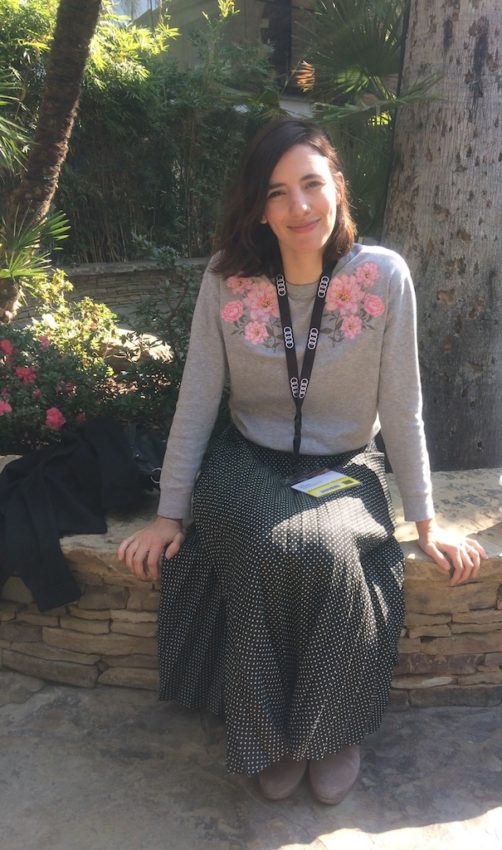
Director Lila Avilés at the Roosevelt Hotel in Hollywood. Photo: Elva Zevallos for LA ELEMENTS
HOLLYWOOD, CA (LA ELEMENTS) 11/19/2018 -“We come from story-tellers,” says Lila Avilés, director of the movie, The Chambermaid (La Camarista) which is set in the filmmaker’s native country of Mexico. The Chambermaid was part of an impressive slate of films that screened during the 2018 AFI Film Festival, which ran from November 8 through November 15 in Hollywood. Lovers of cinema could enjoy panel discussions with some of the biggest names in the entertainment industry and enjoy movies both from the United States, and many other countries around the world.
The Chambermaid came to AFI with a certain amount of acclaim for Avilés that included a New Director Award nomination from the San Sebastian International Film Festival. At AFI Film Fest, her character study of a woman dealing with the frustrations of her job while aspiring to rise above Mexico City’s struggling working class, earned Avilés an Audience Award nomination.
The Chambermaid stars Gabriela Cartol in the title role. The movie opens with a close-up of her character as she stands in the doorway facing away from the hotel room she is about to clean. It’s as though she needs to gather a little strength before she can go about her day. She is startled by the presence of an elderly guest buried underneath a pile of linens on the floor. While she politely asks him if he needs help, he doesn’t respond in kind and literally waves her off. To him she might as well be invisible. Set in a luxury hotel in Mexico City, it’s practically 15 minutes into this film before her anonymity is lifted and we finally learn her name, which is Eve.
Throughout her workdays, we see practically all of the hotel guests talk to Eve only when they absolutely have to and many times, in a condescending manner. Adding to these indignities is the exhaustion that builds as she completes her duties, which include taking care of all of the rooms on the 21st floor of the hotel. The work is so demanding partly because she is such a hard worker with an eye for detail. Eve endures the indignities and the stress mostly because she has to: She is the sole provider of her four-year-old son, Ruben. But also, there is the dream of being promoted to the 42nd floor, the most luxurious floor and the one where the elite clientele are booked. If she wins that promotion, there will be the added prestige to her work that she desperately needs for her sense of self-worth. Eve is 24 years old and can barely read. Understandably, this makes her odds of succeeding at pretty much anything not so great. This is exactly why her efforts to even try are so valiant. Eve doesn’t hesitate to take the GED classes offered by the hotel and is bright enough to not only grasp the math lessons, but also work her way through Jonathan Livingston Seagull. Therein lies the conflict: The book smart, hard working Eve should be a natural for the promotion that she so desperately wants.

Gabriela Cartol in a scene from The Chambermaid.
Yet there are others who want the promotion just as badly including her co-worker Miriam, who goes by the nickname, Minitoy. Minitoy, (played by Teresa Sánchez with the just the right balance of camaraderie and cunning) is a boisterous presence with her laughter and constant joking around. This serves her well in a few ways. One being that it covers up her ignorance in the GED class. The other, she can easily win Eve’s trust. This is especially poignant when you consider that up until that point, Eve didn’t really have any friends at the hotel. Minitoy knows that Eve is in some ways smarter than she is and is certainly a better worker, but she has one thing over Eve: Minitoy can read people extremely well and can choose to use that to her advantage as needed. And in a world where some of the hardest work is done by people getting paid the least amount of money, there may not be much sympathy for a single woman who is doing the best that she can even if she does have a child to support.
Gabriela Cartol gives a beautifully insightful performance in this film. Through Cartol, we see Eve stoically bear the monotony of her job and reveal a reservoir of strength in the process. This contrasts with the moments of pure happiness that empowers her voice and her expression whenever she is speaking on the phone to her son. The audience understands that for him, it’s all worth it. And each time that Eve inquires about a beautiful red dress that she turned into the lost and found and is assured that it will be hers if the owner doesn’t claim it, the radiant smile that illuminates her face reminds you of the young woman that she truly is. A woman who the world has not yet beaten down. While others may choose not to see her, we see her. And we are on her side.
We met up with Lila Aviles at the Roosevelt Hotel during the AFI Film Festival to learn more about the making of The Chambermaid and to find out what’s next for the director.
Where exactly was this movie filmed and why did you choose that location?
The hotel name is Hotel Presidente Intercontinental. It’s in the main streets of Mexico City, Paseo de Reforma. It is a great location because it is in front of our Mexican central park that is Chapultepec Park. So it has a lovely panoramic view of all Mexico City.
Since the movie take place almost entirely in a hotel, it was important to find the one that would convey the right mood for your film.
Yes, and I am so glad and proud that even from the beginning, from my day one, like seven or eight years ago when I wrote the screenplay for theater with a producer at that time, we started to look at hotels. I wanted to do this in a real hotel and this hotel opened their doors to us and we ran the play for like three months. And when I was there, I was so in love with the hotel that I wanted to film there. So from long time ago, I went to that hotel and interviewed chambermaids. I was obsessed with chambermaids and not only in that hotel. So in every place I’d go, other hotels in Mexico, I was the interview girl.
It’s interesting that the hotel agreed to have you film there because in your movie, the hotel management doesn’t always present the best opportunities to their workers.
Well of course, everything is fiction.
There’s a scene in the movie where the workers are taking their GED classes, and that’s so valuable because Eve can barely read. However, at a certain point the classes end and I think the explanation was that the union decided to end this. What’s the story behind that? Are GED classes something that’s offered to the workers in general?
In general, what I like from this particular hotel is that they help a lot. The hotel has the particularity that they give classes so that they can start working at the lobby or other divisions. Of course, there’s a lot of fiction that I put in. There’s a lot of symbolisms that for me was important to put in. Yes, it’s a mix of documentary but a lot of fiction.
In The Chambermaid, Eve is doing well in her classes, but then the classes come to an end just as she was doing what she could to move forward
Sometimes..things happen beyond your control and things happen within your control.
Why did you choose Jonathan Livingston Seagull as the book she uses to study in class?
Well for me, there are a lot of metaphors. As a filmmaker, I love Herzog and he loves seagulls and there’s something in there about optimism and …I like to maintain it open for everyone.
You can’t help but root for Eve. Anyone who sees this film will want her to succeed so badly. There are two things that she wants in the movie. She wants the red dress and then she wants to be assigned the 42nd floor. What did you want the audience to understand about what happens to her as far as getting what she wants and needs in the movie?
I think that sometimes every day we have our own tragedy even if it’s subtle…and there’s something in that connection with the things, with others, and with the absence of what we want that surrounds us, that give us some ways to understand why we are here and that sense of search of identity. Many times we think that something is one way and then you understand that it is the other way.
Sometimes things are simply out of our hands.
Yes and that’s the one day tragedy.
What do you want audiences to take away from your work in general?
I always say that of course for me, cinema is more than entertainment. I see cinema like something profound, like something that makes you change. It’s about what you are living today, your own tragedy of the day. It’s about what touches you. For me as an absolute fan of cinema, I love cinema that’s handmade and that you can imagine a little bit a world that is created by the director or filmmaker. For me that is important.
What did you hope to accomplish by creating a character like Eve?
For me it was important that in this world that’s so fast, and people are always working and on their cell phones, I wanted to follow a character that is sometimes invisible to others and I wanted to maintain that attention. To follow her in her day-to-day life.
You said earlier that you were obsessed with chambermaids. Why?
I think that chambermaids are like those people who are contained in a separate world. That world is a hotel that contains another world that has different nationalities and different spaces. Chambermaids also have that virtue to be in your intimate belongings and your inner world. For me that was so touching and her day-to-day life is working with absence so for me it’s beautiful.
I love that! As they go about their work, they are there, but not really there as long as people don’t notice them. Yet, they enter our private lives and in some ways know more about us …
….than we know! There is… hay una ciencia that has the name ‘antropología de la basura,’ the anthropology of trash. You can understand a little bit who a person is from the trash they throw away. So for me that also interested me.
One can’t help but notice that there seems to be quite a few acclaimed filmmakers coming out of Mexico.
I love Mexico with all my heart. I think there is something about our ancestors, about mysticism, about human communication. There is something in our profound souls and because of what we live, day-to-day. Of course, there is a part of Mexico that has violence, but the other part is that our people are so hard working and they give their lives for their families. And…that thing, I think it’s the “medula” the central part of the artist. That we sometimes need to shout, to say what is happening and to tell something about what we see, what we feel and sometimes what we are.
What is next for you?
I’m writing and developing my next film that is an autobiographical story. It’s about something that happened to me.
Do you want to tell me more about this project or are you going to make me wait?
(laughs) You’re going to wait because I’m so full of energy to continue filming and developing but I want to do it the right way. So, I’m in that research.
Ok…the ending of The Chambermaid….
I don’t want to talk about the end.
Is the ending one of those things where it’s open to interpretation?
Yes. It’s open.
The Chambermaid
Directed by: Lila Aviles
Written by: Lila Aviles and Juan Carlos Marquez
Produced by: Lila Aviles, Pau Brunet, Jana Diaz Juhl, Tatiana Graullera, Carlos Rossini, Axel Shalson
Cast: Gabriela Cartol ,Teresa Sanchez
Cinematography by: Carlos Rossini
Still photos courtesy of Pau Brunet
Follow LA ELEMENTS on Instagram and Twitter. Like us on Facebook.





No Comments